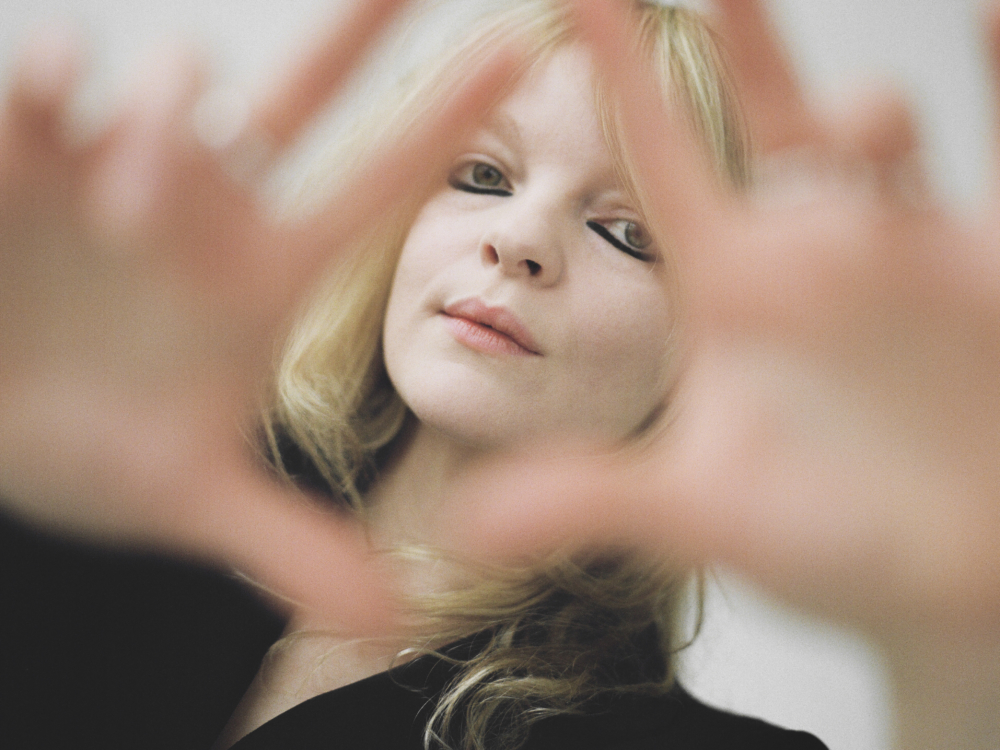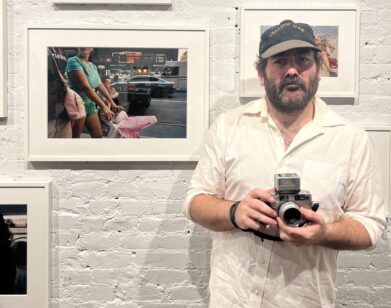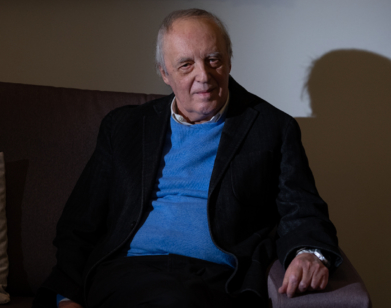Jessica Pratt and Daniel Arnold Escape the Mania of Creativity for a Moment of Calm Reflection

When she speaks, Jessica Pratt sounds like she’s reading instructions, or perhaps, like someone who used to do counter service. Calming and clear, the songwriter’s thoughts are laid out flat in conversation. In a rare moment, she’ll circle an opaque idea until she turns it transparent. It’s a voice that finds its domain in smoky last calls and long-distance phone calls — the radical opposite of her transfixing singing style. Its domain is mostly unutterable, and there are better ways, perhaps, to describe it than with words — images of ornate jewelry, etchings on a wall, dusk-light, an eggshell. Fortunately for us, there’s no need to draw comparisons to Pratt’s vaporous melodies (though it’s so hard to resist), just as much as its pointless to discern where her music emanates from. The pleasure of her records, particularly her latest album Quiet Signs, is their self-seclusion. Since her lo-fi debut in 2012 recorded in her San Francisco bedroom, her subsequent albums have offered a retreat from the seeping sewage and clamor of life in these times, or more accurately, life in one’s own head. It’s this inaccessibility, here a term of praise, of the songs themselves — the source of them, the memories involving them — that Pratt discusses at length with her longtime friend and “people’s champion” Daniel Arnold. Despite spending his days on city streets or in the homes of semi-famous people, the Brooklyn-based photographer tells Pratt that he rarely leaves the “emergency space” of his head. Over the phone, on the day before Pratt’s album release, the pair spoke about the bliss of being lost in one’s mind, and the strange rewards that accompany the occasional journey outside of it. —NATHAN TAYLOR PEMBERTON
———
JESSICA PRATT: I’ve been looking at your photos for so many years at this point, and I’m in total awe of the process. I always think of you out there weaving between people. At the end of the day I know that you must do it for the thrill of the experience, but do you ever feel fried by humanity?
DANIEL ARNOLD: I definitely get fried, but I think it’s more circumstantial than it is because of humanity. Often when I’m doing assignment work, I’m given very specific parameters and a very strict time limit to perform miracles. My body of work exists because I go out everyday and work exhaustively. To have to recreate that in a day is horribly daunting. It still knocks me out. But making a concerted effort to see the world in a new way everyday insulates me from that problem of getting fried by humanity. It’s my job to be in awe of it all the time.
PRATT: It’s easy to imagine being emerged in all these coursing energies and trying to keep your head above water. It makes me think of instances where I’ve played shows as an opener for a big band and the audience is talking at 120 decibels. I have to play through it. People will ask me, “Isn’t it difficult?” “Don’t you feel overwhelmed or angry?” But, it’s a similar headspace, where you’re just locked in to what you’re doing, and it grants you grace and immunity from the noise, so that you’re not really actively experiencing the tension. It just flows over you.
ARNOLD: The problem of being in your head in these situations doesn’t exist because you don’t have access to your head. You go into that emergency space and you perform automatically.
PRATT: It’s the greatest thing. I think if I didn’t have that outlet accessible to me I think that things in my head would grow in a very frightening way. When your head just becomes purely white noise, it’s a very blissful experience. It’s difficult to describe to people who haven’t experienced it.
ARNOLD: I get to walk away from these really out of body experiences, where I don’t remember moment to moment what I’m experiencing, and then I get to go home a few days later and sort through the proof of it and see what my brain did without control of itself.
PRATT: It makes me think of the best basketball player in the world or something. Or like when I’ve written and recorded a song. You really don’t have concrete memories of writing it. It’s just bits of awareness within a larger dream space. It makes me feel like my brain is really powerful, but it’s also frustrating. I don’t know how to harness that power.
ARNOLD: You can’t do it on purpose. You can’t even revisit it. I end up catching myself manufacturing impossible circumstances, like sabotaging my day so that it reaches a pitch where I can’t be calculating and I can’t plan anything. I just have to be there and let muscle memory do the button pushing while I pay attention.
PRATT: If someone hasn’t read interviews with you, you could be seen as an intimidating figure. I’m sure people make all kinds of snap judgements about what you’re like as a person.
ARNOLD: It’s an incredibly bizarre experience, especially at home with such a level of visibility. Fairly often, I’ll be approached on the street by trembling adult men. I’m like, “What? You have got this all wrong.” I spend the first three minutes convincing them that they’ve got the wrong guy. You should not be nervous about me ever.
PRATT: I feel like that happens to me, but it’s like with a 20-year-old gay kid in Minnesota or something. It’s more reasonable in that instance.
ARNOLD: That’s a good one.
PRATT: Something I’ve heard you say before is that everybody is just a human and anyone is capable of making something interesting. I appreciate that.

PEMBERTON: One question for both of you: What are instances where you have met someone with your misconception of them?
PRATT: I was nervous to do this thing in general, but I recently went to a Destroyer show. I knew that he [Dan Bejar] was a fan of some of my work, and I’ve been a long time fan of his since I was like 15 or something. I’m contradicting myself as far as judging people for these assumptions because when you thought of someone as this fictitious figure in your head for so long, it’s really difficult to not treat them as this lofty figure. I felt like I reverted to my 13-year-old self.
ARNOLD: Did he live up to that billing? In five minutes of small talk?
PRATT: Yeah, there wasn’t much time.
ARNOLD: You can dismantle your mythology in five minutes if you are talented.
PRATT: What about you, Daniel? Have you ever spoken to somebody where you feel like a complete noob?
ARNOLD: I can’t think of any notable examples, but I feel like that happens to me at least half of the time that I interact with anybody. At this point, my daily go-to head space is so insulated and so purpose-driven that if you catch me in the midst of that, I am not a controlled version of myself, and I will either just manically run my mouth like I’m doing here or I can’t get a sentence out.
PRATT: That’s really relatable, for sure.
ARNOLD: I think it’s a getting older thing, too, where you end up having more and more control over keeping your comfort zone around you. I have a job where I am basically supposed to go where I’m uncomfortable and deal with it, but usually I get to do that in a pretty silent, non-interactive way. The task of social improv has become more and more difficult.
PRATT: It’s interesting what you said about age being a factor because I just think at this point I have fewer friends than I’ve ever had in my life, to a startling degree. I used to work in customer service for years, and I feel like I was a much different person then.
ARNOLD: On the phone or in person?
PRATT: I worked at some small, shitty jobs when I first moved to San Francisco. I worked at Tartine Bakery for a really, really long time. It’s a place that’s always swarmed with people from all over the world. There are language barriers. Really angry rich people demanding things. I was fearless back then, and I feel like I’ve lost all of that.
ARNOLD: I have a dumb interview question for you even though I’m not the interviewer.
PRATT: No, I think you are.
ARNOLD: Has singing with the voice that you sing with for all this time affected the way that you speak? Has it found its way into your talking voice?
PRATT: I had one meeting with a vocal teacher recently, and she told me that I need to speak in a much higher tone, like this [Pratt talks in her singing voice] all the time.
ARNOLD: That’s very useful information.
PRATT: Which I haven’t put into practice.
ARNOLD: What can you do. You are what you are.
PRATT: You have a lifetime of developing your own sense of humor. I’ve always had sort of a sarcastic tone. It’d be like pretending to be another person. But, she also said, over time, that the way I talk could degrade my vocal chords, so it’s pretty scary.
ARNOLD: You got to pretend you’re somebody else to preserve who you actually are.
PRATT: I need to start speaking like an aristocrat or something.
ARNOLD: How reliable is your singing voice? On the rare occasion when I’m supposed to open my mouth to make song sounds in front of people, it’s totally unreliable, and I have no control over it.
PRATT: It’s gotten worse with the new songs. There’s a wider range, there’s different textures. It’s all stuff that works very well when you’re singing into a microphone in a pin drop, quiet subterranean studio, but then when you’re in a venue and you’re trying to do it accurately, it can be challenging. Then, there’s the odd nights when you play your worst show and that’s when everybody tells you you did a great job. I’ve lost any real idea of how things are.
ARNOLD: What were you listening to while you recorded the album?
PRATT: The things that I return to time and again. Scott Walker, Bert Bacharach, Todd Rundgren, Dusty Springfield. Things that I’ve loved forever. But also a lot of jazz. I’ve been living with my boyfriend, Matt, for a couple years, and he’s always playing tons of stuff I’ve never heard that’s weird, so there’s also that wild card element.
ARNOLD: That’s a good relationship perk.
PRATT: I’ve really been impressed with the range of references that people have been coming up with for this record. It’s really nutty. I feel like that’s the most fun part for me.
ARNOLD: There’s something about your songs that touch the memory part of the brain instead of the active engagement part of the brain. It feels like your music is from somewhere else.
PRATT: You listen to a lot of music and then you make music, and it comes out in some strange way. My brain muddies things enough so that whatever comes out it’s not super derivative. But, there’s an echo here and there. I like that quality in other people’s music, as well.
ARNOLD: The sin of being derivative is miscast. It’s good to be a little derivative, but I don’t think your songs are. It’s more like a wormhole thing where there’s this disembodiment and loss of time. Maybe that’s it. Maybe, I’m remembering it from listening to it in the future because time isn’t real.
PRATT: We both make work that’s slightly multidimensional, which is a cool thing to have in common. I think the greatest achievement of my life has been people calling my music “timeless.” I used to have a really hard time accepting any type of compliments, but I feel like that one has been my main objective.
ARNOLD: I have only one compliment that I feel comfortable with, too, and the rest freak me out. Sometimes people will tell me that I’m the “people’s champ.” I don’t even know what that means, but I like it.
PRATT: Not to get broody, but my mother was an astrologer. You’re a Pisces if I remember?
ARNOLD: You are correct.
PRATT: They’re involuntary humanitarians, and I think it goes back to that porous nature that you can’t really control. You’re just an open wound to the world. I think you’re just empathetic by nature and especially with the work that you do, it involves tons of strangers. Your photography literally objectifies people because they’re the subject of a photo, but it feels compassionate.
ARNOLD: I hate when I hear the opposite because people do say the opposite.
PRATT: Oh, I know.
ARNOLD: I think it’s a misunderstanding. Or maybe I’m just an egomaniac.
PRATT: I don’t think that’s the case. Based on everything you’ve said.
ARNOLD: I think we’re both pretty lost in the mania of this particular challenge. At least I am.
PRATT: I wish this is how interviews went all the time.






